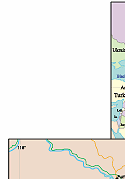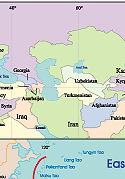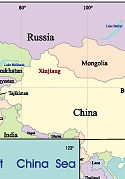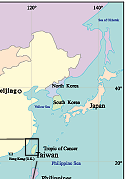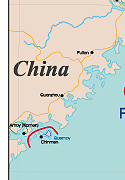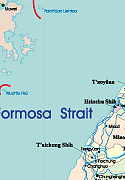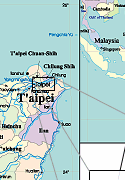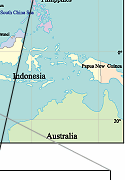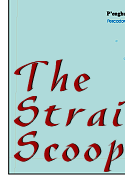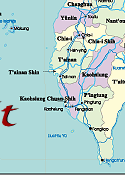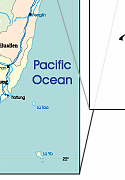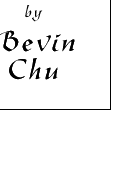|
January
18, 2002
The
Big Lie of Taiwan's Election
A Lie Heard Halfway around the World
"A
lie gets halfway around the world before truth can even get its
boots on."
~ Sir Winston Churchill
The
tragic aftermath of our US-led war against the Serbian people revealed
one thing – our intrepid Fourth Estate got the story of Kosovo
exactly backwards. Now the establishment media has reprised its
sorry performance in the Balkans. It has gotten Taiwan's 2001 legislative,
county and municipal elections exactly backwards as well. You would
never know it from the deluge of "expert commentary" by
Taiwan independence fellow travelers, but Taiwan's election does
not represent a "mandate for Taiwan independence." It
merely confirms what genuine China experts have known all along
– enthusiasm for political independence on the island continues
to wane with each passing year.
THE
BIG LIE
"There
is no truth in Pravda ("The Truth"), there is no
news in Isvestia ("The News").
~
Cold War era Russian joke
The
Taipei Times ["Has
Beijing Got the Message Yet?," December 4] has alleged
that the 87 seats won by the Democratic Progressive Party (DPP),
plus the 13 seats won by Lee Teng-hui's Taiwan Solidarity Union
(TSU), out of a total of 225 in the Republic of China legislature,
amount to a clear and unequivocal mandate for Taiwan independence.
Nothing
could be further from the truth.
The
Taipei Times is the English language mouthpiece for the Taiwan
independence movement. It is to the DPP and TSU what Pravda
and Isvestia were to the Russian Communist Party. Just as
there was no news in Isvestia, and no truth in Pravda,
so there is little news and less truth in the Taipei Times.
What the Taipei Times offers in abundance is "dezinformatsiya,"
the KGB's term for deliberate and systematic deception as an instrument
of official policy.
Needless to say, the Taipei Times' mendacious post-election
spin control is being parroted by all the usual suspects, notably
"Yellow Peril" China-baiter William Kristol ["Embrace
Taiwan," Washington Post, December 4]. What a surprise.
For a good laugh, courtesy the Taiwan independence amen corner,
see "Has
China Seen the Light?" [the Christian Science Monitor,
December 6]. This slapdash bit of "expert commentary"
amounts to an open admission of complete and utter ignorance concerning
its purported subject matter.
THE
HARD FACTS
Those
who read Chinese and want to know the true significance of Taiwan's
2001 legislative, county and municipal elections owe it to themselves
to read an eye-opening article entitled "Who
Won?," by Sisy Chen, former Public Relations Chief for
the DPP, now one of the Taiwan independence movement's most feared
critics. Chen is especially formidable in bare knuckles television
debates with her former comrades, because, as the DPP's former "Minister
of Propaganda," she "knows where the bodies are buried."
Those
who can't read Chinese, relax. Chen's insights have been incorporated
into this article.
Sisy
Chen, along with former DPP party chairmen and "White Terror"
political prisoners Shih Ming-teh and Hsu Hsing-liang were the DPP's
political superstars. Shih, who was imprisoned for three decades,
is Taiwan's Nelson Mandela. Because they were far brighter than
the typical Taiwan independence True Believer, all three saw the
light and repudiated not only the DPP, but Taiwan independence per
se.
They
repudiated the the Democratic Progressive Party because it had betrayed
its founding ideals: democracy and progressive government. They
repudiated Taiwan independence because they realized, however belatedly,
that Taiwan independence was not in the best interest of ordinary
men and women on Taiwan. Together with former New Party Chairman
Jaw Shau-kang, former New Party legislator Chu Hui-liang, they have
founded a forward-looking pro-reunification thinktank known as "Shan
Meng" or "Mountain Alliance."
Sisy Chen has mentioned on her nightly TV program that she is one
fourth Japanese. Legendary Ming dynasty Chinese hero Cheng Cheng-kung,
aka "Koxinga," was half Japanese. Let no one accuse this
columnist of anti-Japanese bigotry. This columnist's outrage has
always been animated by moral/ethical considerations, never ethnicity,
and has never been directed at fellow human beings of Japanese origin,
only at Japanese militarists and colonialists who victimized China.
As Chen notes, the actual vote totals reveal something seriously
amiss with Taiwan independence spin control. For starters, votes
cast in favor of pro-reunification Pan Blue candidates clearly outnumber
votes cast in favor of pro-independence Pan Green candidates.
Voter Turnout, Legislative Elections – 66%
Pan Blue – 50%
KMT – 29%
PFP – 19%
NP – 3%
Pan Green – 41%
DPP – 33%
TSU – 8%
I have purposely rounded the percentages off to the nearest whole
number, making them easy to remember and track, even though doing
so introduces a slight rounding-off error.
As you can see, the DPP performed worse this year than it did two
years ago. DPP legislative candidates received 33% of the vote,
6% fewer than DPP presidential candidate Chen Shui-bian received
during the March 2000 presidential election, when he squeaked into
the president's office with an underwhelming 39% plurality.
At the grassroots county and municipal levels Taiwan independence
suffered an even worse setback. Sure, the Pan Green parties captured
45% of the county and municipal level vote, up from 43% in 1997.
But the Pan Blue parties captured 47% of the county and municipal
level vote, up from 42% in 1997! Northern and central Taiwan are
now in Pan Blue hands. Only southern Taiwan remains in Pan Green
hands.
THE
REAL TRUTH
So
how did the Pan Green parties wind up with so many seats in the
ROC legislature? Specifically, how the hell did the DPP, which received
a mere 33% of the total vote, wind up with 39% of the 225 seats
in the legislature? Thirty-three percent of 225 equals 74, right?
How did the DPP wind up with 87 seats, 13 more than their vote totals
warranted?
Simple. Taiwan boasts, if that is the right word, a peculiar voting
system, assumed to be the only one of its kind in the world. In
the US two or three candidates compete for a single seat in an electoral
district. On Taiwan dozens of candidates compete for a half dozen
or so seats in an electoral district. On Taiwan elections resemble
an "every man for himself, the devil take the hindmost,"
free-for-all. This system is not without merit, but also has drawbacks.
On the one hand it permits constituencies which might be totally
shut out to achieve at least minimal representation. On the other
hand it pits candidates from the same party and candidates from
different parties but similar political platforms against one another.
These candidates can wind up bumping each other off, leaving their
constituents without representation. A candidate with a smaller
constituency and dramatically different political agenda can then
waltz into office over his opponents' corpses. A larger constituency
can go unrepresented, even as a smaller constituency winds up overrepresented.
This is exactly what happened on December 1, 2001.
The pro-reunification Pan Blue parties, each struggling to maintain
or expand their existing power base, nominated far too many candidates.
The pro-independence Pan Green parties, on the other hand, nominated
an optimum number of candidates and successfully apportioned their
votes among them. This apportioning of votes is referred to as "pei
piao."
The result was Pan Blue candidates averaged down each others' vote
totals. KMT, PFP and NP candidates got elbowed aside by DPP and
TSU candidates in district after district, even though Pan Blue
votes island wide outnumbered Pan Green votes. The sole exception
was the PFP, which grew from 19 seats to 46 seats, primarily at
the expense of the NP.
The squeaky-clean, ethical-to-a-fault New Party was virtually wiped
out, a grotesquely undeserved victim of a combined "xi gua
xiao ying" ("Watermelon Effect") and "qi bao
xiao ying" ("Dump/Save Effect.) Voters were shocked and
dismayed when NP and KMT lawmakers rated among the top five in the
ROC legislature lost their bids for re-election. Among them were
Lai Shi-bao (NP), Hsieh Chi-tah (NP), and Ting Shou-chung (KMT).
Too many Pan Blue candidates plus faulty Pan Blue vote apportioning
added up to Pan Blue disaster. The media even coined a name for
the phenomenon – the "Lai Shi-bao Effect," after the
universally admired New Party legislator. By then of course it was
too late. Farsighted and courageous NP lawmakers Fung Hu-hsiang
and Fu Kuen-chen also fell victim. Overall the Pan Blue "alliance,"
and I use the term loosely, decimated its own ranks with "friendly
fire."
WHY
DIDN'T SOMEBODY DO SOMETHING?
Somebody
did. The New Party tried vainly to drag their larger Pan Blue allies
to the negotiating table. New Party elder Wang Chien-hsuan vigorously
championed a coordinated Pan Blue candidate nomination protocol
to ensure that pro-reunification votes were not split among two,
three or even more Pan Blue candidates. New Party elder Yu Mu-ming
went even further, and boldly organized and led a Pan Blue march
calling for "San he yi, zhu zheng dang," or, "Three
into One, Form One Party."
Little came of it, except the potential imminent demise of the idealistic
New Party. Neither ambitious PFP party chairman James Soong nor
selfish KMT local party bosses were willing to negotiate in good
faith. New Party willingness to compromise for the sake of a Pan
Blue victory was misperceived as lack of political will. Many Pan
Blue voters voted PFP. Others stayed home.
The outcome, widely predicted by everyone from political reporters
to taxi drivers, was referred to as "Yu ong de li," meaning
"The fisherman benefits." "Yu ong de li" refers
to the Chinese fable about a stork and a clam. Each has the other
in a death grip. Neither is willing or able to let go. A fisherman
scoops them both up, the serendipitous beneficiary of their lose/lose
struggle.
Taiwan's election was no "mandate for Taiwan independence,"
it was merely one more dismal repeat of "Yu ong de li."
It was the 1994 Taipei mayoral election, which saddled Taipei with
A-Bian for four dreary years. It was the 1996 presidential election,
which saddled the ROC with "Mr. Democracy" Lee Teng-hui
for four more years. It was deja vu all over again.
The central challenge for the Pan Blue leadership is to reorganize
the KMT, PFP and what's left of the NP into a unified political
force, either a trans-party alliance, or a single political entity.
If they can pull this off, key political offices such the presidency
or the Mayorship of Taipei, a stepping stone to the presidency,
will never again be occupied by Japanophile quislings plotting treason
against the Constitution of the Republic of China. If Pan Blue leaders
can't find some way to work together, Taiwan independence opportunists
will continue to exploit Pan Blue disunity.
ONE
COUNTRY, TWO SYSTEMS: THE WILL OF THE PEOPLE
Now
you know the real story. The December 1, 2001 election was not a
"victory for Taiwan independence." The vast majority of
Chinese on Taiwan – Aborigine, Minan, Hakka, "mainlander" – have never opposed reunification, providing the mainland was
no longer communist, no longer totalitarian. They never rejected
China, they never considered themselves anything other than Chinese,
they merely rejected communism and totalitarianism.
None of what Sisy Chen and I have written is news to Chinese people
on Taiwan. You will never read about it, however, in the Taipei
Times, which is not a newspaper, but a propaganda organ. Its
raison d'etre is not to report the news, but to peddle a political
agenda – Taiwan independence. Its primary weapon is Americans'
lack of facility with the Chinese language, who by default rely
on the Taipei Times because it is written in English.
Support for cross-Straits reunification has been climbing steadily
since Chen Shui-bian was elected two years ago, and is currently
at unprecedented highs. Independent polls conducted periodically
since March 2000 reveal, to the dismay of Taiwan's quisling elite,
that the Chinese people on Taiwan now want reunification, sooner
rather than later.
Poll Results in Favor of "One Country, Two Systems,"
in Chronological Order
United Daily News – 33%
China Times – 29%
TVBS Cable Channel – 31%
Fung Hu-hsiang (New Party) commissioned poll – 48%
CTN, China Television Network – 52%
The trend is hard to miss, wouldn't you say?
Not long ago Chen Shui-bian's own Mainland Affairs Council polled
the Taiwan public regarding "One Country, Two Systems."
To ensure that they got the low numbers they desperately wanted
for propaganda purposes, the MAC's "pollsters" prefaced
their questionnaire with a long-winded description of what constituted
"One Country, Two Systems." The only problem was the system
the MAC was describing was not "One Country, Two Systems,"
but "One Country, One System." Their deception backfired
when 16% of the Taiwan public in effect endorsed "One Country,
One System." Not exactly the result they were hoping for. The
moral of this fable? Don't ask questions unless you're willing to
hear the answers.
I haven't even mentioned the estimated one million "Tai Shang"
or "Taiwan merchants" and their families currently living
on the mainland on an essentially permanent basis. They voted too – with their feet. That's close to 5% of Taiwan's entire population.
Twenty years from they'll no longer be "Taiwan Chinese,"
they'll be "mainland Chinese," and they'll have been joined
by millions more. Taiwan has no provision for absentee voting. Imagine
how they would vote if it did?
TAIWAN'S
QUISLING ELITE
The
only segment of Taiwan society which categorically rejects reunification
with the mainland is an invisible but influential Japanophile elite,
comprised of ethnic Japanese members of Taiwan's colonial era ruling
class and their ethnic Chinese collaborators. This seedy "elite"
is enamored of everything Japanese and contemptuous of anything
Chinese. It never reconciled itself to Taiwan's restoration to China,
never came to terms with Japan's surrender in 1945, and is obsessed
with prying Taiwan away from China for a second time and reannexing
it to Japan.
This Quisling elite would have Americans believe that the majority
of Chinese on Taiwan yearn for a "Republic of Taiwan"
separate from and hostile to the Chinese mainland. Sad to say, they
have been largely successful. Their Big Lie has been swallowed hook,
line and sinker by much of the American public. Just remember, the
next time you come across Taipei Times "dezinformatsiya"
posted on the internet, you are reading lies which have gotten halfway
around the world before truth could even get its boots on.
AN
IDEA WHOSE TIME HAS COME, AND GONE
Remember
how incredulous, how disoriented we were in 1989 when the Berlin
Wall came tumbling down? Who could have imagined that the "Evil
Empire" had been on the verge of imploding and the Cold War
approaching its oddly anticlimactic conclusion?
Lee Teng-hui, Chen Shui-bian and Annette Lu may be greeted by cheering
self-styled "Taiwanese, not Chinese" waving green and
white "Republic of Taiwan" flags in Texas and New York.
But back on Taiwan, political independence is an idea whose time
has come, and gone.
In "Taiwan
Independence, RIP" I wrote,
"A-Bian has arrived at a fork in the road. Both roads lead
to One China. Take one and arrive before dusk, warm, dry and refreshed.
Take the other and arrive at the same destination after midnight,
cold, wet and exhausted. The route is optional; the destination
is not."
Two years into his first and hopefully only term, A-Bian has
chosen to take the long way around. Too bad. As I said, "The
route is optional; the destination is not." China will be reunified.
Maybe sooner than anyone in 2002 can imagine.
|
